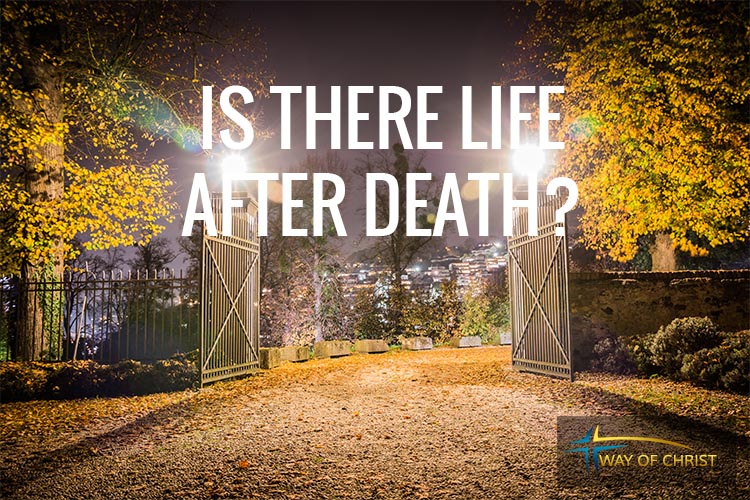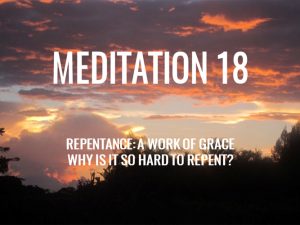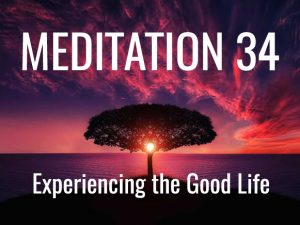Life after death? When Paul, the first century Christian, was asked about life after death (about people who had physically died and were in the grave [1 Cor. 15]), he gave a powerful discourse on the hope and the assurance that those believers would experience life again. His assurance of their life to come was the simple fact that he had experienced life after death many times in the present earthly life. He knew the mystery of the life of dying.
Paul had been moved from experiencing life in the fleshly realm to experiencing life in the spiritual realm. While he was still earthly, through the process of life after death, he had experienced the heavenly. He had been snatched away from the mortality of his flesh to meet the immortal Jesus in the spiritual realm. Although still in the world, he was no longer of the world. Jesus Christ was now being manifest in his life. He had experienced life after death. He knew he would experience it again.
The mystery of life after death
An apple falls to the ground. The meat of the apple slowly begins to decay. Finally, the seed of the apple is set free.
The seed germinates in the soil. It loses its outward husk. The essence that is within the kernel now springs forth to new life.
Eventually, the seed of the apple produces another apple tree, which, in turn, produces more apples. The process of the cycle begins again with the falling of an apple to the ground. Life of the inner essence always comes out of the death of the outer essence.
Jesus said,
Verily, verily, I say unto you, Except a corn of wheat fall into the ground and die, it abideth alone: but if it die, it bringeth forth much fruit. He that loveth his life shall lose it; and he that hateth his life in this world shall keep it unto life eternal (John 12:24,25).
The apple “was made subject to vanity, not willingly, but by reason of him who hath subject the same in hope” (Rom. 8:20). It must experience the dying off of its outer tabernacle. When new life springs forth, however, the groaning and travailing ceases with adoration and exaltation to the glory of God.
The apple, as with all of creation, cannot prohibit being created subject to vanity. It will experience the “bondage of corruption” (Rom. 8:21) the slavery of decay, that is necessary to bring forth new life. Since the apple does not have the capability to think about what is happening, however, it continually brings glory to God in its death and resurrection.
Paul was experiencing this truth when he said,
We are troubled on every side, yet not distressed; we are perplexed, but not in despair; Persecuted, but not forsaken; cast down, but not destroyed;
Then, he added,
Always bearing about in the body the dying of the Lord Jesus, that the life also of Jesus might be made manifest in our body. For we which live are alway[s] delivered unto death for Jesus’ sake, that the life also of Jesus might be made manifest in our mortal flesh. (2 Cor. 4:8-11)
Hope of life after death is in Jesus our life.
Life can be experienced because Jesus comes forth out of the trouble, perplexity, persecution, and being cast down. Jesus Christ is “made manifest in [man’s] mortal flesh.” The everlasting life conquers the mortality of the flesh (2 Cor 5:4).
Obviously, there is mystery in life after death. As the body dies off by the circumstances of life (the outworking of God in day to day living), it is “sown in corruption . . . dishonour . . . weakness . . . a natural body” (1 Cor. 15:42-44). The life that comes forth out of this mortality, however, “is raised in incorruption . . . glory . . . power . . . a spiritual body” (2 Cor. 15:42-44). The life of “Jesus [is] made manifest in [the true believer’s] body” (2 Cor. 4:10). In this present robe of flesh, life is resurrected.
Unfortunately, when trouble, perplexity, pressure, and the sense of being cast down by the forces of nature occur in life, they all too often do not produce life in the mind of man. They produce distress, despair, and the sense of being destroyed by life. When we attempt to live in the outward man, we will always find ourselves fighting against the very thing of which we are, a created entity that will go through the cycle of death and resurrection.
When God takes us through the trouble, the perplexity, and the pressure of life his intentions is the manifestation of his Son, Jesus Christ, in our lives (2 Cor. 4:8-10). With the outer man perishing by the trouble, the perplexity, and the pressure of daily living, the inner man is “renewed day by day” (2 Cor. 4:17).
Life after death is discovered in the unseen.
The secret is the seeing. If your focus is not on the things which are seen (trouble, perplexity, and pressure) but on the things which are not seen (realm of the Spirit), you experience the miracle and the mystery of life.
Life after death is experiencing Christ being raised out of you through the death of your effort to experience life. The pressures of life (like the condition of the ground that causes the seed to germinate [Mark 4:3-8]) is the means by which “the glorious liberty of the children of God” (Rom. 8:21) can be experienced in man.
Jesus said,
Come unto me, all ye that labour and are heavy laden, and I will give you rest. Take my yoke upon you, and learn of me; for I am meek and lowly in heart: and ye shall find rest unto your souls. For my yoke is easy and my burden is light. (Matt. 9:28-30)
Jesus, “the way, the truth, and the life,” can set your spirit free from the decaying, dying dust of the earthly tabernacle.
Just as all of the rest of creation “groaneth and travaileth in pain together” for the breaking forth of life from within its tabernacle, we also groaned within ourselves for that Life. We groan “waiting for the adoption, to wit, the redemption of [our] body” (Rom. 8:23). With waiting meaning “to expect fully,” they, who have experienced the “yoke of Jesus,” know the body will lose all control and the spirit will be set free. Everyone can expect fully “the redemption of [his] body.”
You can be loosed (meaning of the word redemption) from the “earthly house of [your] tabernacle” (2 Cor. 5:1). You can be rid of any control whatsoever of the flesh. His spirit can be set free within you to experience “the glorious liberty of the children of God” (Rom. 8:21). It is life after death.
Death has to occur before there can be life after death.
Life can only be experienced in the dying-off of the flesh. Unless man always bears about the dying of his flesh, the Spirit of life within him cannot produce life. The pressure of life itself is the means of that dying process.
Trouble, perplexity, persecution, and being cast down in themselves do not produce life. They, in fact, produce the opposite, the dying. However, it is this dying that enables man to have the possibility of life in Christ.
If the death producing circumstances produce a “godly sorrow” (2 Cor. 7:10), an agonizing for being in the flesh, they will work “repentance to salvation.” The life of Jesus will come forth.
If the death producing circumstances, however, produce the “sorrow of the world,” an agonizing for being in the circumstances, they will only produce the death that is within the circumstances themselves. The agonizing that arises from being “in the flesh,” as opposed to being “in the circumstances,” is the difference between life and death.
As your body dies off by the circumstances of life, it is “sown in corruption . . . dishonour . . . weakness . . . a natural body” (1 Cor. 15:42-44). The life that comes forth out of this mortality, however, “is raised in incorruption . . . glory . . . power . . . a spiritual body” (2 Cor. 15:42-44). The life of “Jesus [is] made manifest in [your] body” (2 Cor. 4:10). In your present robe of flesh, life after death is experienced.
Paul’s assurance in life after death in the life to come.
When Paul was asked about people who had physically died and were in the grave (1 Cor. 15), he gave a powerful discourse on the hope and the assurance that those believers would experience life again. His assurance of their life to come was the simple fact that he had experienced life out of death many times in the present earthly life.
Paul had been moved from experiencing life in the fleshly realm to experiencing life in the spiritual realm. He had been delivered from the life of the earth to experience the life of heaven. He had been snatched away from the mortality of his flesh to meet Jesus in the air, to meet the immortal Jesus in the heavenly realm.
Although still in the world, he was no longer of the world. Jesus Christ was now being manifest in his life. He had experienced life after death. He knew he would experience it again.







